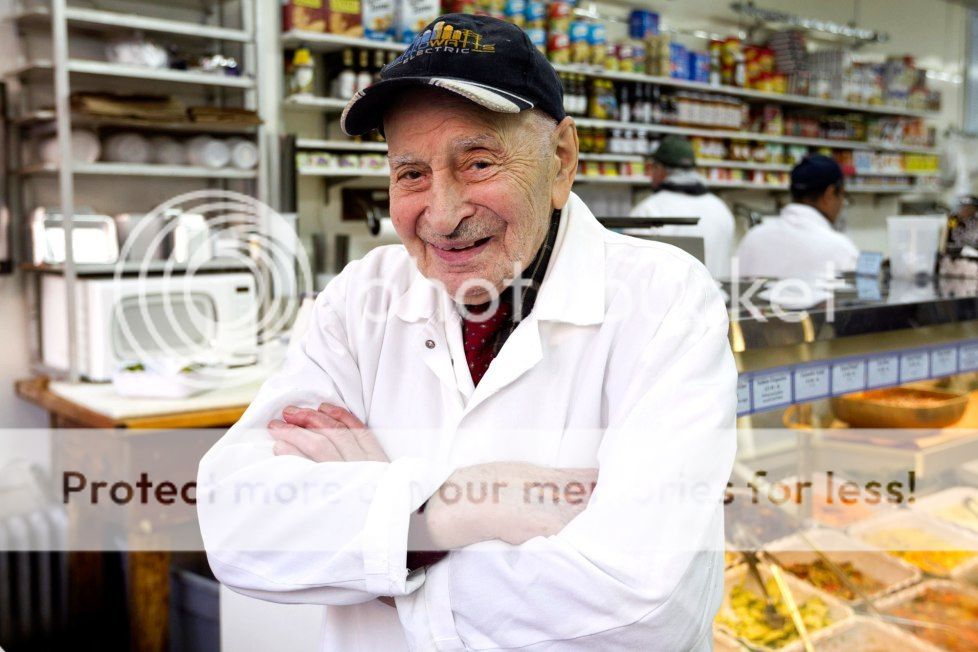On a bustling morning before the storm of the century, Upper West Side patrons crowd the counter at Fischer Bros. & Leslie, angling for the best cuts of veal chops, silver tip, London broil and deckle. Behind the counter, butcher Ernie Fleischman maintains a cool countenance and takes it all in stride.
He is, after all, 95.
“I’m here as long as they’ll have me,” says Fleischman, who started slicing kosher meats when he was just 17 years old and the city had hundreds of kosher butcheries. There are now just five such shops in Manhattan, and the nonagenarian is the oldest of the men behind the few remaining counters.
Modal Trigger Fischer Bros. & Leslie at 230 W 72 St. Fleischman began there in 2000, two days after selling his own shops due to rising rents.Photo: Anne Wermiel
Fischer Bros. & Leslie at 230 W 72 St. Fleischman began there in 2000, two days after selling his own shops due to rising rents.Photo: Anne WermielHe’s seen a lot of changes in the industry over the years. The biggest, he says, is his customers. It’s no longer the balaboostas coming in to gossip and pick up brisket.
“A lot of men do the shopping now,” Fleischman says. “Now, that housewife goes to work. Everyone has to work.”
Butchering is in his blood.
His father ran a thriving kosher butcher shop in Altmuhr, a tiny German town of just 1,000 people.
“Non-Jews would shop [there too],” Fleischman says proudly of the shop in his still-thick Yiddish accent. When he was just 8 years old, his dad was forced to shutter the business after Germany issued an order banning kosher meat from entering the country.
“I’m amongst people. That’s the most important thing to me.”
In 1937, when he was 17, he fled the rising tide of anti-Semitism for New York. A distant family member already safely in the US saved up enough money for his passage. Fleischman’s parents and 7-year-old sister, Alice, had to stay behind. At that point, he had seldom left the tiny village where he’d been born, and he’d only been educated until age 14 because of growing anti-Jewish sentiment.
“I had no idea what Manhattan was,” he says. But the decision his parents made to send their eldest away saved his life.
Just weeks after arriving in America, Fleischman pounded the pavement on Madison Avenue, going door-to-door looking for work on a brutal February day. He was flat-broke and staying with a distant cousin in Queens who didn’t want him around.
Modal Trigger Fleishman fled Germany for Manhattan in 1937, when he was 17. His parents and 7-year-old sister had to stay behind, and later died in concentration camps.
Fleishman fled Germany for Manhattan in 1937, when he was 17. His parents and 7-year-old sister had to stay behind, and later died in concentration camps.“I was so hungry that day. I only had a nickel — at the time, the cost of the subway — and I went into a dairy restaurant where the food looked so good,” he remembers.
Fleischman couldn’t speak English, but a stranger noticed the young man’s plight and bought him some green-pea soup and rye bread. “To this day, it was the best meal of my life.”
He found work at the since-closed Harry Weiner butcher on Madison and 96th. It wasn’t a glamorous job, but it paid the bills.
It was “nothing to be proud of — you have to eat and make a living,” he says.
At 23, the German-Jewish refugee was drafted into the army and sent to Germany. He returned from the war — and to the butcher’s profession — in 1946 and was greeted with devastating news.
Fleischman’s parents and sister had died in the concentration camps.
He was distraught, but soon was introduced through family to Trudy, a fellow German Jew who was “smart and nice.” They married in January 1948 and settled in Washington Heights, where he still lives today. Fleischman continued working as a butcher, opening his own shops. The couple had three kids.
Modal Trigger Fleischman has three children, 17 grandchildren, and 58 great-grandchildren. His wife, whom he married in 1948, died over a decade ago.Photo: Anne Wermiel
Fleischman has three children, 17 grandchildren, and 58 great-grandchildren. His wife, whom he married in 1948, died over a decade ago.Photo: Anne WermielThe job can be dangerous. Early in his career, he worked alongside a shochet (a certified ritual slaughterer) who was killing calves — and mistakenly sliced through Fleischman’s left ring finger.
“I wrapped it in a shirt and continued to work,” he says nonchalantly. “Three days later I had blood poisoning. They gave me a 50-50 chance. That shochet was half asleep, I think.”
Modal Trigger Fleischman started slicing kosher meats when he was just 17 and the city had hundreds of kosher butchers —now there’s only five.Photo: Anne Wermiel
Fleischman started slicing kosher meats when he was just 17 and the city had hundreds of kosher butchers —now there’s only five.Photo: Anne WermielTrudy died over a decade ago, but Fleischman has a large family — 17 grandkids and 58 great-grandchildren. He sold the last of his own shops on a Monday in 2000 due to rising rents. The following Wednesday, he started working at Fischer Bros. & Leslie.
The owners initially didn’t want to hire him but relented on the condition that Fleischman bring some of his old customers with him.
“He has a following,” says Fischer Bros. partner Paul Whitman.
Being around his loyal clientele and fellow butchers are why he keeps working, Fleischman says.
“I’m amongst people. That’s the most important thing to me.”





